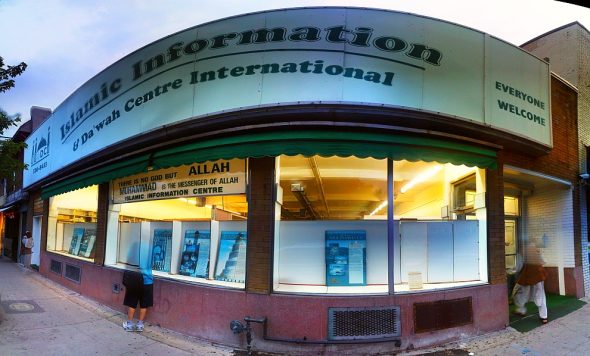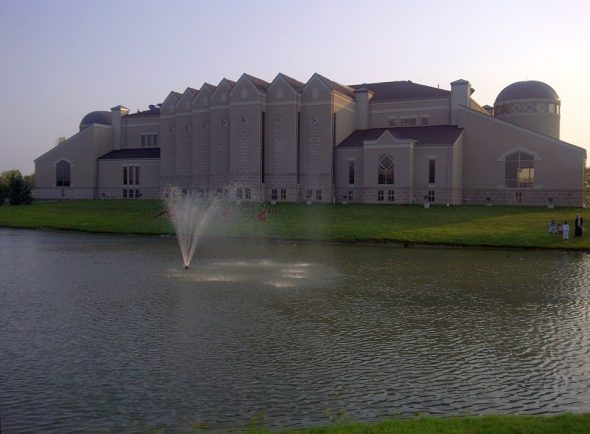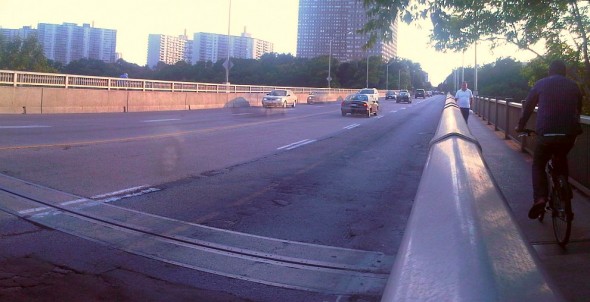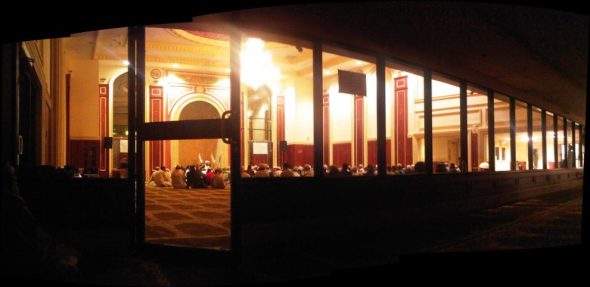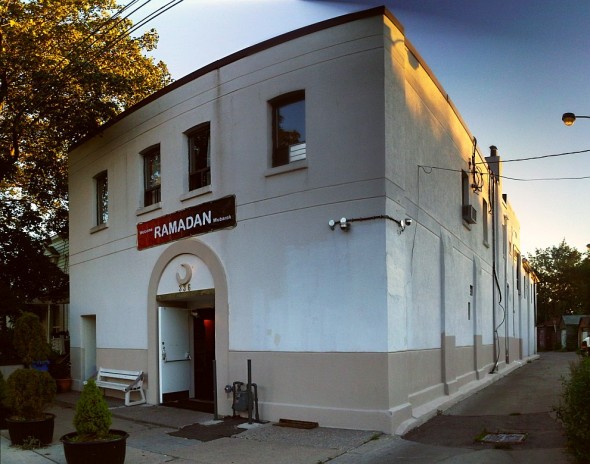Comments Off on Day 14 – Toronto’s Muezzin, Adnan Sirajuddin
Share it:
Comments Off on VIDEO: Day 25 – Qiyam ul Layl – Islamic Information & Dawah Centre
Day 25 – Qiyam ul Layl – Islamic Information & Dawah Centre
Category:
Tagged with:
Share it:
Comments Off on VIDEO: Day 25 – Masjid al Taqwa – 14 Ladysmith Avenue
Day 25 – Masjid al Taqwa – 14 Ladysmith Avenue
Category:
Tagged with:
Share it:
Day 14 of Ramadan turned out to be the one where I broke fast in my neighbourhood masjid, the Islamic Information and Dawah Centre International, founded by Brother Shabbir Ally.
This is where I began the 30 Masjids journey on Day 0.
This would be my pit stop before continuing 30 Masjids into the second half of Ramadan…
Category:
Tagged with:
- 30Mosques
- Aisha Mosque
- Amica
- Anglo-Indian Variety of English
- BIC
- Bloor Street
- Bosnian Islamic Centre
- Bowling Alley
- Dawah
- Dawah Centre
- Discover Islam Posters
- Dufferin Station
- Falls Church
- Flyers
- Hakeem Olajuwon
- Hamza Masjid
- ISL Software
- Jami Mosque
- Kaleem
- Kids
- Let The Qur'an Speak
- Making My Ramadan Cool
- Mc
- Montreal
- Mosque Guide
- Muhammad Qadir
- New Muslims
- Parkdale
- Quality Gap
- Salesman
- Shabbir Ally
- Tag-Team-Taraweeh
- The Alim
- Video
- Water cooler
- Youtube
- Zuhair
Share it:
Comments Off on Day 24 – Noor Islamic Cultural Center | By Elyas
By Elyas (@PirateSomali) in Columbus, Ohio
Salaamu Alaykum!
I am delighted to have the chance to contribute to Brother Syed’s Ramadan project. I’ve learned of his initiative through another blog run by two friends who are also doing the same project that Brother Syed is doing.
Since the two friends decided to steer their project in a controversial path I decided to have nothing to do with their blog.
So now I am following Brother Syed’s Ramadan project. Furthermore, I learned that the Brotha allows his guests to contribute to his project.
Realizing that, I decided why don’t I visit my local mosque and take pictures and videos.
So that’s what I’ve done.
Category:
Tagged with:
Share it:
30Mosques.com | Day 24: Moving Along
Comments Off on 30Mosques.com | Day 24: Moving Along
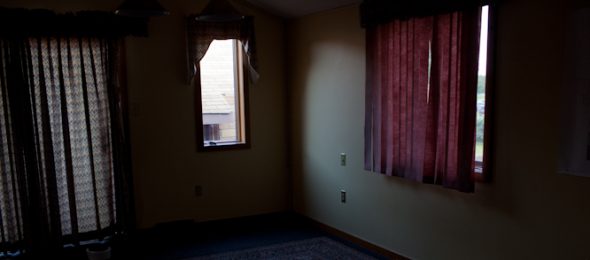
By Bassam Tariq
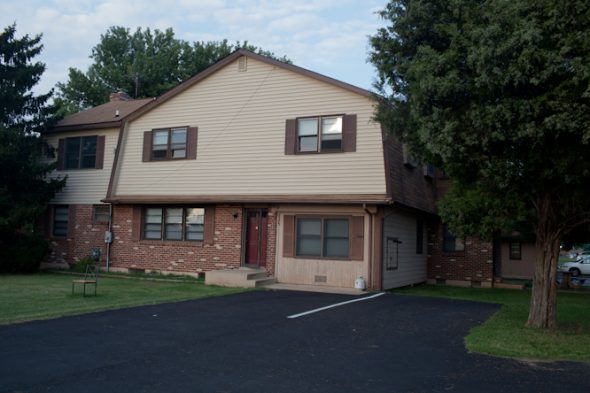
We find ourselves outside of a large house in Newark, Delaware that will soon be known as the Glasgow Community Masjid.
According to Murat Kose, a member of the community, there are about 15,000 to 20,000 Muslims in Delaware. About a thousand of them are Turkish. Many of them own businesses in the area.
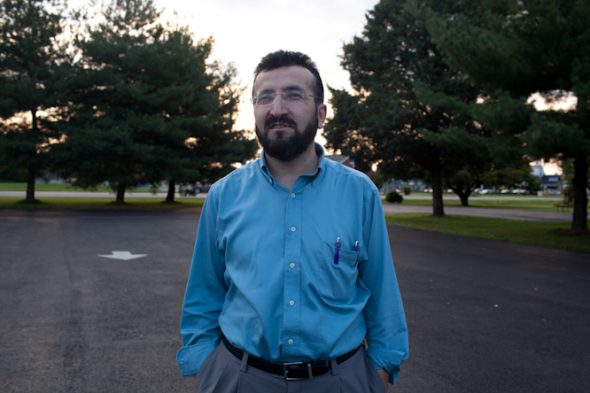
“Every diner you go to in the city, it will be owned by a Turk.” Murat exclaims.
Murat came to Delaware for business as well. His background is in chemical engineer and he was working on his PhD when he decided to create his own telecom company. He now runs the local office of Zakat, an Islamic aid organization based in Chicago.
The congregation at the mosque is mostly Turkish as well. The imam, Mahmut is 25 years old. He came to Delaware through an Imam training program in Turkey. He recently married and now lives in the mosque.
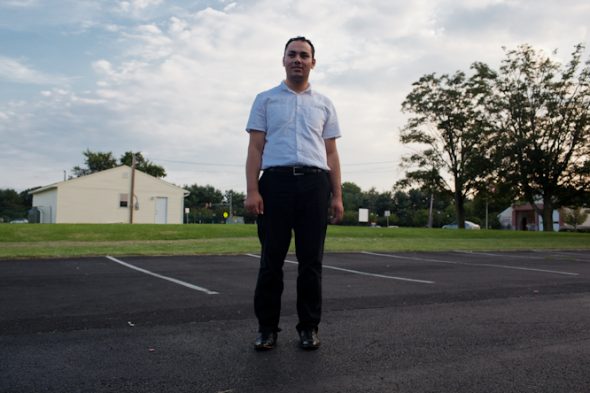
“I really think you should have visited the other mosque.” Says Murat Kose. “It’s bigger and more people go there.”
But this is where I wanted to be. Being on the road for the past 24+ days, it feels nice to finally have our feet planted. Here, I didn’t hear Aman singing to bad 80′s songs. All I heard was the wind and the call to prayer. For once, I don’t feel like moving. I want to stay in place and get to know the people. These are the kind of mosques that I like to see, the ones with large, mismatched carpets and toys laying around. Where the kids are always running around and the tea is always brewing. I understand the need for larger mosque spaces but sometimes, the coziness and intimacy gets lost. It reminds me of the small communities we have visited this year and their unpretentious manners that bind them all together.
Inside the prayer space, the way the light falls from the windows is incredible. A man prays alone by the curtains. Outside the window, you see kids playing around the swings while a mother watches over. Many spaces we have visited this year are blanketed by industrial lights and commercial carpeting. This mosque, like Imam Jamil’s and many other house mosques, embraces its form and celebrates it.
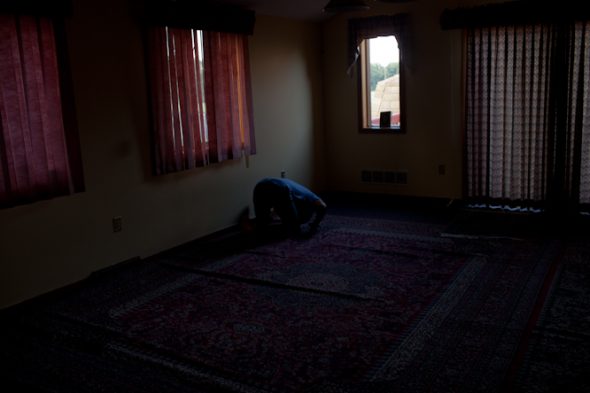
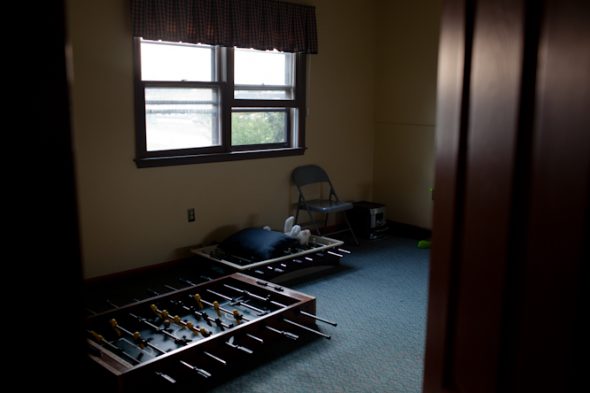
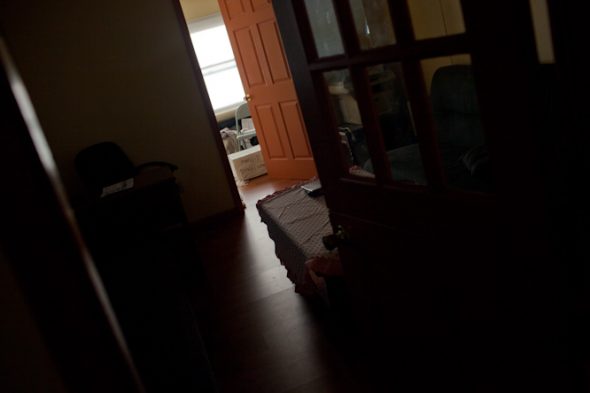
Our time in Delaware gets cut short because of a prior commitment we made in another state. So we drive off in to the distance waving goodbye to Murat and Imam Mahmut.
Still I wonder, what it would’ve been like if we spent the night at the community. The tea drinking, the bad Turkish jokes, the short taraweeh prayer and, most of all, the nice comfortable home to rest in. Being on the road for so long takes a toll, but they say that prayer is better than sleep. So we continue on our way, there is more to see and claim as home.
Category:
Share it:
Comments Off on 30Mosques.com | Day 23: Battered But Not Beaten
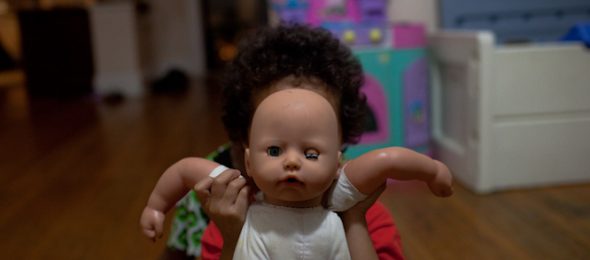
By Aman Ali
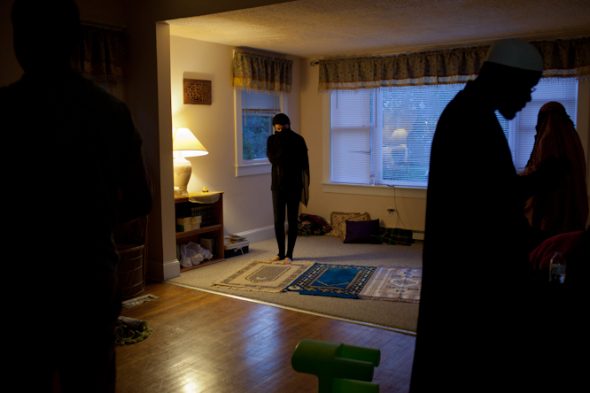
Note: To ensure the safety and privacy of these women, they put on face veils and used different names in this interview to not reveal details about their identity.
Saima came to the U.S. from Pakistan for marriage. For lack of a better phrase, she went through four years of hell.
“I was in a different country and didn’t know the language,” she said in Urdu to me. “I had no family members here to help me. He forced me to stay in a basement, I was beaten, I was tortured and I was abused. I had no way communicating with my family for help.”
Just forming the words to talk about the abuse she went through is tough for her. She repeatedly pauses and looks the other way recollecting the details of the marriage she is seeking shelter from.
She’s one of many women here at Muslimat Al-Nisaa, a domestic violence shelter for Muslim women located in the heart of Baltimore. It might be the only shelter for battered Muslim women in this country. These women’s stories are a painful reminder of why the Muslim community can no longer sweep the issue of domestic violence under the rug.
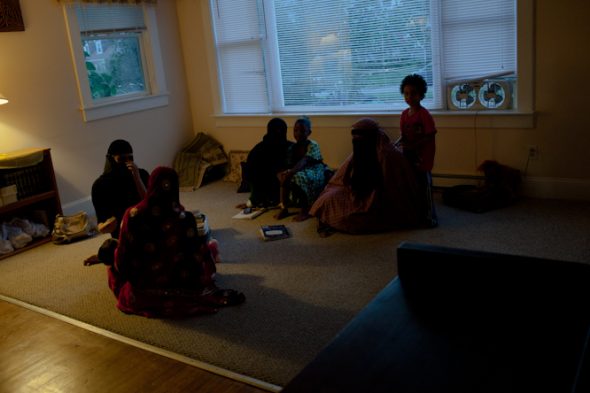
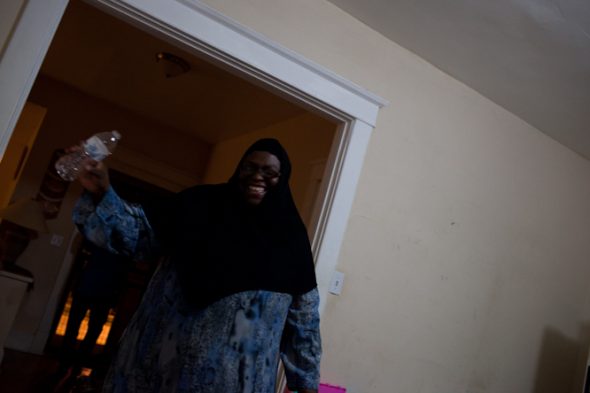
“This isn’t about religion,” said Jamila Gardner, a longtime volunteer here. “It’s a matter of men and their disrespect. The sad thing is, it doesn’t matter what religion these kind of men have. They have this attitude of ‘You’re mine, I can do with you whatever I want.’ When in reality, Islam has freed women and given them the same rights as her husband.”
My hand trembles as I scribble in my notepad these women’s stories. I’m reminded of all the abuse I learned about growing up regarding several women in my family. As Saima tells me her story, I can’t help but think about the time as a kid I pulled bloody shards of glass out the back of one relative after her husband pushed her through a table. Or the time one woman begged me to make her laugh because it was the only thing stopping her from crying about all the fiery red belt marks that streaked across her soft skin.
Reading this is a downer, sure. But our sentiments pale in comparison to the women going through it like Sara, who fell in love and married a longtime friend before her tale of romance was torn to shreds by his abusive behavior.
“It feels like a train hitting you,” Sara said. “How do you keep all of this pain inside of you when you’ve just gone through a train wreck? When he makes you feel like ‘You’re responsible for it, it’s your fault. Why did you talk back? Keep your mouth shut.’”
Sara sits next to Saima and comforts her throughout the conversation. She grew up in England and speaks with a dash of British elegance when she articulates her story. She said when she first dealt with her husband’s abuse, she initially went to her local mosque for help, but to no avail. The men there either shrugged off her problems or said they didn’t know how to help.
“I’ll put it to you straight,” she said. “You Muslim men, not all of you, but the ones who pretend to be the best Muslims, you are ignorant. You look at your own daughters and sisters in a different way. You would treat them in a different way than other women in your community. You all have daughters and you all have sisters and mothers. It’s your job to protect the Muslim women in your community and stand up for them.”
Asma Hanif is the executive director of the center. She said when the shelter first opened in 2007, it was tough to get the Muslim community to support it because they were in denial the problem existed to begin with. Then came the case in 2009 when Aasiya Zubair was gruesomely beheaded by her husband
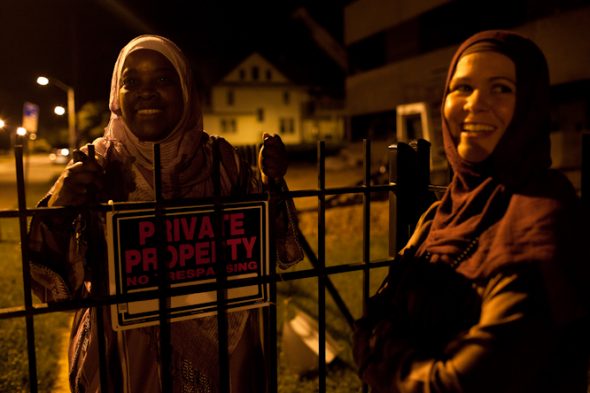
Asma Hanif, left, hangs on the gate of the Al-Nisa Women’s Shelter.
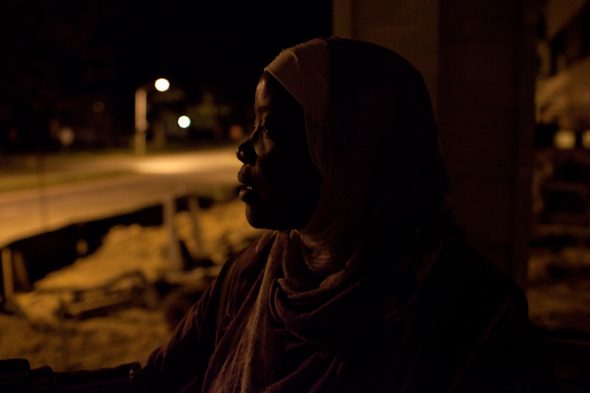
Asma Hanif stands at the door way of the shelter.
“It wasn’t until Aasiyah was beheaded, when the community said ‘Ok, we need to talk about domestic violence.’ This wasn’t something they could hide anymore.”
A few scholars in the Muslim community including Imam Zaid Shakir urged people to support An-Nisaa. But the shelter is still in dire need of support. Oftentimes, the shelter struggles to even cover its electric bill for the month.
“If somebody beheading their wife didn’t mobilize the community to do something about this, God, what would?” she said shaking her head before she paused. “…I can’t even answer that question.”
Asma is just as tenacious with her jokes as she is with her intolerance for apathy on this subject. After dealing with maddening case after case of abuse at the shelter, I asked her how she copes with the frustration.
“ I’m crazy, don’t you know that?” she quipped while rattling a backscratcher at me. “I’m like straight up Looney Tunes. I wear purple every day, come on. I’m straight up crazy, can’t you tell?”
“I tell people I cry every day,” she said while composing herself. “I meet these women and I hear all their sadness and sorrow playing in my head. Then I go into the community asking for help and all I hear is “No.”
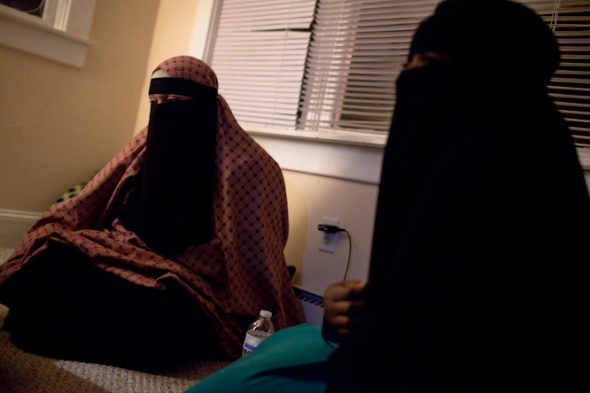
Amy, left, sits with Tahira, left, in the small prayer space.
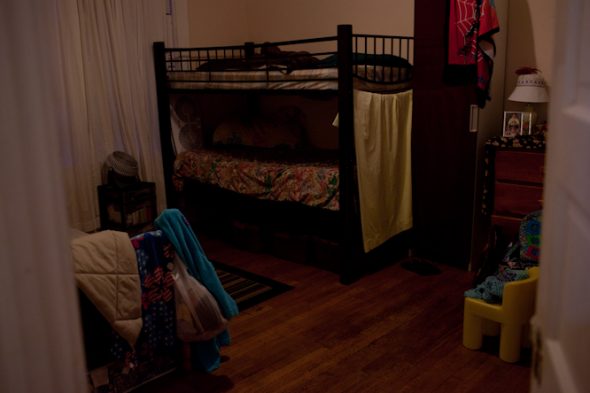
One of the many bedrooms in the shelter.
After dinner, I joined two women studying a few verses of Quran. One of them was Tahira, who was born Muslim but adopted by Christian parents. For years she dealt with verbal abuse from them and battled depression as a result. She even tried to commit suicide several times.
“My mother would yell at me all the time and tell me I was fat,” she said. “She would say my adopted parents gave me up because nobody wanted me. I knew that wasn’t the truth but it would still have an effect on me year after year.”
Sara told me in many cases, verbal abuse is just as bad as physical abuse, if not greater.
“Physical abuse is going to go away,” she said. “You’re going to heal and you’ll get better. But those emotional scars, those don’t go away. The verbal abuse, the anxiety you’re put through that leads to depression… that’s not something that’s easily swallowed.”
Tahira then discovered her Muslim roots and researched the religion before embracing Islam in April this year. Her family wanted no part of that and she’s now in the shelter as a safe haven.
“I’ve been a practicing Muslim for about four months,” she said. “I have a long way to go before I can open up my arms to them and say “Ok, I understand.” I still have a process to go through because emotionally I’m not ready.”
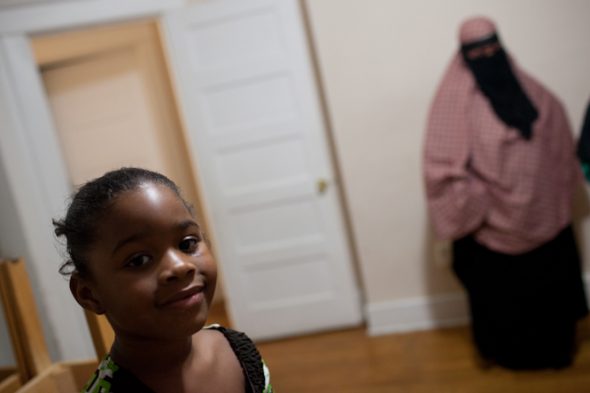
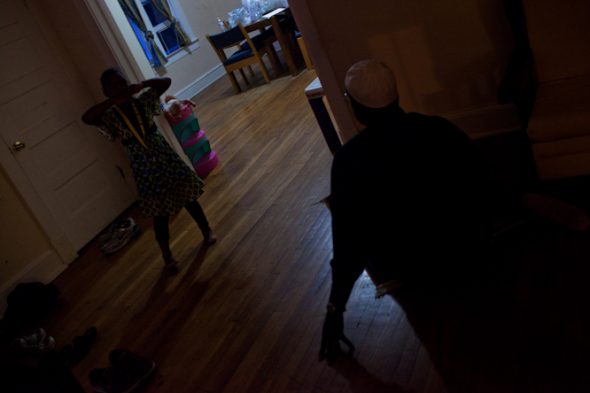
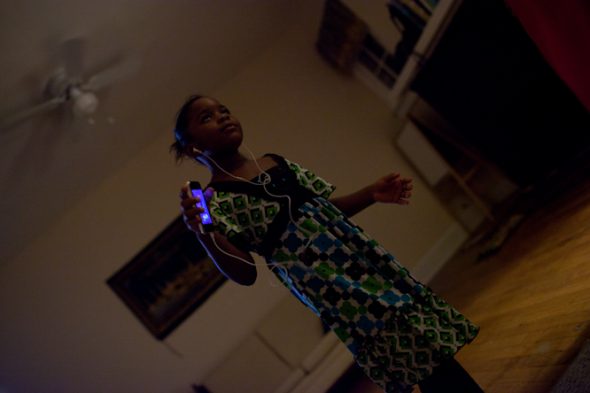
Considering her adopted parents abused her, I asked her if she ever wondered why they would even adopt her to begin with.
“Oh yeah, almost every day,” she said. “But there’s a reason for everything. This was Allah’s way of bringing me back to Islam and put me here in this town where there are a lot of good people here. It was Allah’s way of saying ‘I’m ready for you and have something in store for you.’”
The woman next to her, Amy, nodded in agreement. Amy dealt with several years of abuse from her husband as they raised children together. Both of them embraced Islam after getting married but things didn’t change.
“Embracing Islam together, I thought things would get better,” she said. “But he just didn’t want to practice.”
Amy’s son interrupts our conversation by walking up to me and rubbing my head.
“Mom, he’s bald!” he said with a giggle.
“I see you got jokes,” I retorted back. “I’ll tell you what, give me like 10 minutes more to talk to your mom and I’ll play a game with you where you can rub my head all you want. Deal?”
“Deal,” he said while shaking my hand.
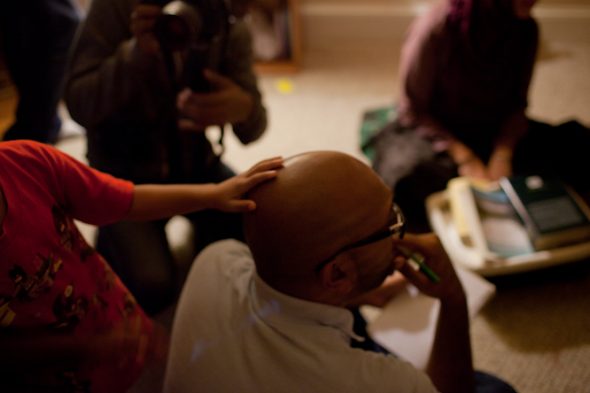
Amy said she left her husband because he wanted her to stop practicing Islam. And that’s when enough was enough. Like Tahira, she too sees her struggle as divine plans for bigger and brighter things in her future.
“It was Allah’s plan” she said. “Everything happens for a reason. There’s a reason why I met my husband. If I would have never been with him, I would have never found Islam. It might have been a bad situation, but at the same time, it produced something beautiful.”
These stories are moving, but there’s a good chance in about five to ten minutes we’ll forget about them. Don’t. You probably know at least one person in your life dealing with abuse. Do everything you can to help them. If you think it’s a damn shame nobody is supporting this Muslim women’s shelter, put your money where your mouth is.
But whatever you do, don’t feel pity for these women. That’s not what they’re looking for. Pray for them. And pray that God gives you the same amount of strength and courage he gave them to deal with this.
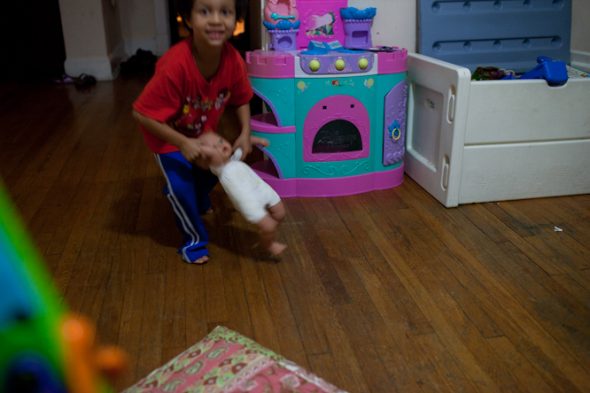
Category:
Tagged with:
Share it:
Category:
Tagged with:
Share it:
Comments Off on VIDEO: Day 24 – Masjid Omar Farook – 4640 Kingston Road, Scarborough
Day 24 – Masjid Omar Farook – 4640 Kingston Road, Scarborough
Category:
Tagged with:
Share it:
Comments Off on Day 13 – Hijazi4u – Abstract Qur’an Artist
Meet Muhammad Abbas Hijazi.
An abstract artist who was showing his work at the First Qur’an Festival.
Category:
Share it:
Comments Off on Day 12 – Jame Abu Bakr – Scarborough Muslim Association
On the second Friday of Ramadan, I spent 23 hours at Jame Abu Bakr / Scarborough Muslim Association.
I came for the second Juma Prayers, and stayed until a Janaza Funeral Prayer was said for a elder Muslim sister who had passed away.
InshAllah I’ll update this blog post in depth time permitting.
For now, here are unedited photos during those 23 hours.
Category:
Share it:
Comments Off on 30Mosques.com | Day 22: Understanding Love
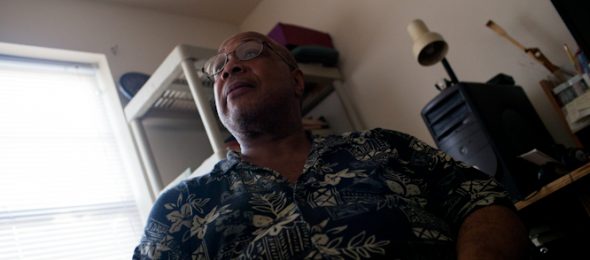
By Bassam Tariq
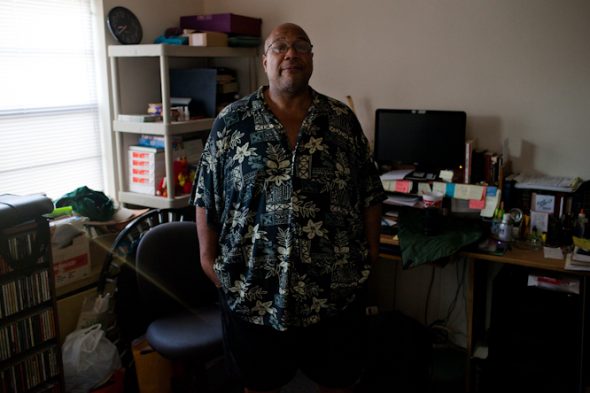
We met a gay Imam yesterday in Washington DC. Before we go any further I thought I’d take a moment and do a Frequently Asked Questions section so we can get passed the obvious questions and move to the story.
FAQS
WHAT’S THE STORY?
He goes by Imam Daiyee Abdullah and lives in Washington D.C. He is known as the gay Imam because many queer Muslims come to him for advice on how to live a balanced and spiritual life. He is a large man that towered over both Aman and I. He also has a mean handshake.
WHERE’S THE MOSQUE?
For now, it is a makeshift mosque. They meet at a public library in Washington DC for Friday prayers.
HOW DID HE KNOW HE WAS GAY?
Imam Daiyee grew up in a very loving family and always knew that he was gay. He finally came out to his parents when he left for college at the age of 15. At the time, his name was Sidney and he wasn’t Muslim. His family had always instilled in him the importance of believing in God. They themselves are Southern Baptists, but accepted their son when he came out.
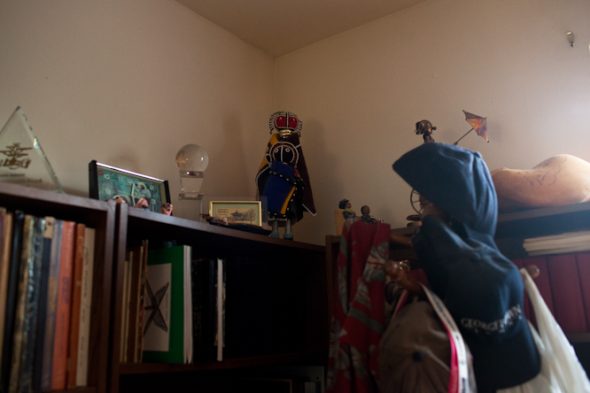
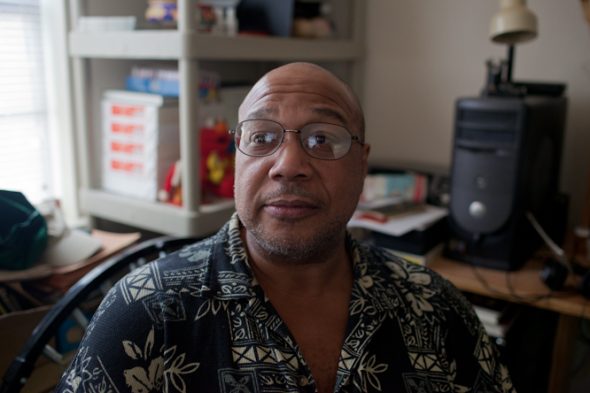
HOW DID HE FIND ISLAM?
Oddly enough, in China. He was studying the Chinese language at Beijing University in the early 80’s when he befriend many Uyghur Muslims. He was very moved by the faith. The first Quran he ever read was in Chinese and Arabic. He had been exposed to Islam before with the small Wahhabi and Nation of Islam communities he ran into during college. At that time, the religion didn’t make much sense to him. Ironically, it was when he read the Quran in Chinese that it all came together.
WAIT, WAS HE STILL GAY WHEN HE EMBRACED ISLAM?
Yes. Imam Daiyee has always been a spiritual man and believed in the importance of having faith. What attracted him into Islam was prayer. “With Islam, it’s totally different. In sujood [prostration], I felt like I could release all my anxieties to Allah.” He also feels that the faith gives him a greater inner peace that no other religion has given him.
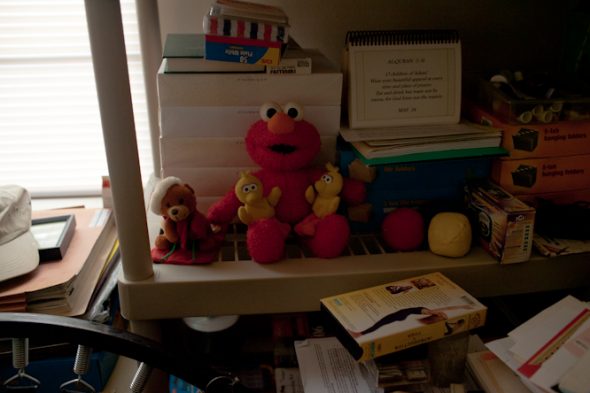
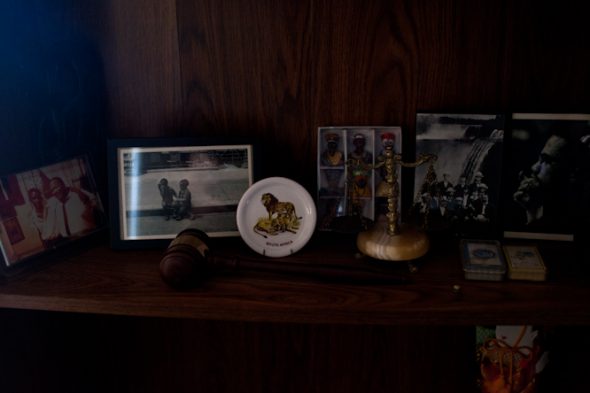
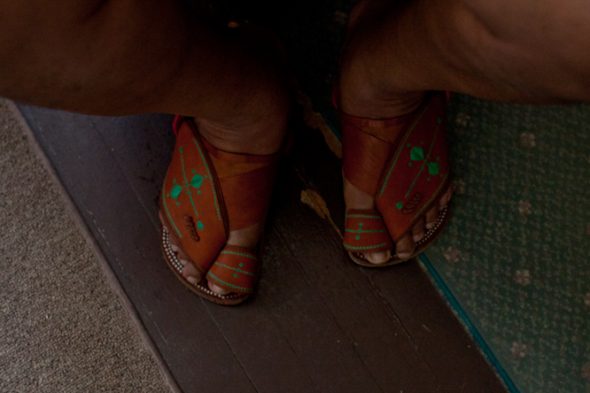
HOW DID HE RECONCILE ISLAM’S VIEW ON HOMOSEXUALITY AND HIS OWN PRACTICE?
This is where it gets interesting. Imam Daiyee Abdullah was introduced to Islam by the Uyghurs. Apparently, they have been Muslim for over 1300 years because of their tradings with the Arabs. In Imam Daiyee’s eyes they have a wider and more nuanced understanding of Islam and one that is closer to the Prophet’s time. They were very accepting of his homosexuality and embraced him wholeheartedly.
From the moment he was Muslim, Imam Daiyee never saw a conflict between with Islam and homosexuality.
OKAY GOT IT – WHY DOES 30 MOSQUES CARE?
Great question. We are looking to share compelling and relevant stories about Muslims in America. We have celebrated those in the mainstream Muslim community and have also highlighted communities that would be considered on “the fringe.” It was important for us to meet someone from the Queer Muslim community because they exist and their story is an important one. Do I necessarily have to agree with their beliefs and values? No, but I should respect it.
There are countless stories that we have covered this year on communities or people we wouldn’t see eye-to-eye with and that’s what this year’s challenge has been for us. It is for us to step into these difficult conversations and to try to empathize and understand where the other is coming from. That’s the only way we can celebrate the human experience and climb out of our own ignorance.
ARE THERE MANY QUEER MUSLIMS IN AMERICA?
There is no real way to know how many Muslims in the US are queer, but Imam Daiyee estimates about 6%. In his own informal observations, he says that they tend to be well-educated, in their mid to late twenties. They come from all over the world, there is no one real ethnic majority in the congregation.
WHY IS THIS RELEVANT?
We are afraid as a community to touch this subject because we feel the religion doesn’t accept it as a lifestyle. Many muslims right now see homosexuality as a phenomena that doesn’t effect Muslims. We take the Ahmedenejad “there are no homosexuals in Iran.” But what will we do if one of our siblings comes out? If our child tells us they are gay? Or a close friend? Will you still love them? Will you shun them? Beat them?
——
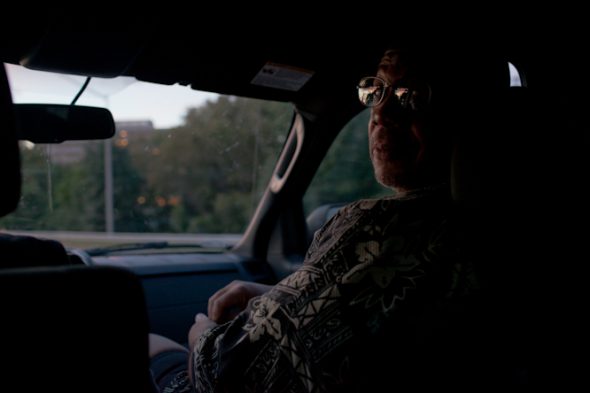
THE STORY
Imam Daiyee has had a few partners in his life. His first long-term committed relationship was when he moved to San Francisco. He is now on his third relationship and for the first time, the person he is seeing is Muslim.
“Every man I’ve dealt with has had children.” He says with a belly laugh.
Many of Imam Diayee’s relationships have been with men that used to be married and have children. His last partner and him were together for 11 years and after they broke up, his partner remarried.
“He remarried?” I ask, puzzled. “to a woman?”
“Yes.” Imam Daiyee replies. “A little while into our relationship he told me that he missed being with a women. I told him ‘that’s fine, but you cant be with the both of us.”
His ex-partner, we’ll call him Ted, wanted both. Imam Daiyee felt that wouldn’t be right. He believed in a committed relationship and believed that there needs to be a standard and a limit to how they have their relationship. Ted didn’t get it.
This entire conversation happens as Aman and I are dropping off Imam Daiyee at his home in DC. We are on our way from having dinner together. This conversation makes me uneasy. It is odd for me to see an Imam, or some kind of Muslim leader talk about his gay boyfriends. It’s hard to accept that Imam Daiyee and I see the world differently because of how our sexual orientation molds our perspective.
It has to be said, there are limits to my understanding of the queer experience because I have never been in a romantic relationship with another man nor have I yearned for that. I am part of the heterosexual norm. But now, Imam Daiyee and I have come together because of our belief in the same God and our upholding of a high moral and ethical standard.
“Is it hard to be in a relationship with someone that’s not Muslim?” I ask since Ted was a Christian.
“Yes, the value systems are different. I’m always explaining myself.”
After the relationship with Ted, Imam Daiyee was in a hiatus for about three years. He is now dating again and, for the first time, he’s a Muslim.
“He also has kids, he’s divorced.” Imam Daiyee says, “I guess I’m here to soften’em up.”
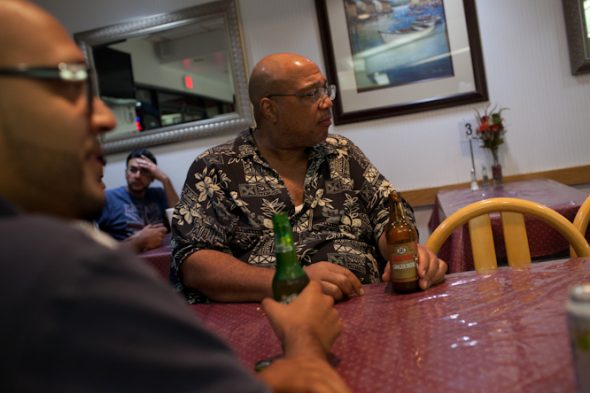
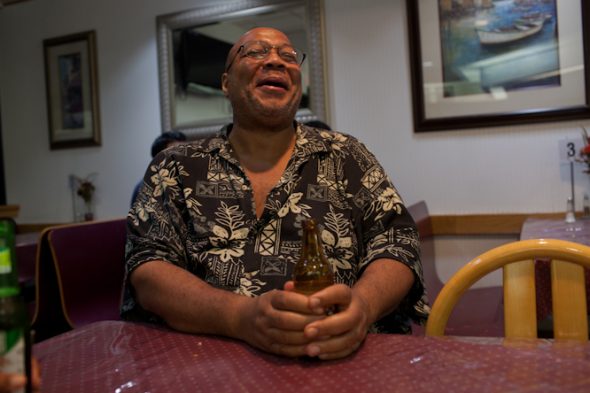
Imam Daiyee laughs again and we all join in. He is a man of great humor and ease. The questions I’ve asked him throughout the day have been very pointed and difficult, but he answers them with grace and respect. He is a patient man that is in no hurry. In answering questions, he takes his time and gives his answers with care.
“We are in a mutah [temporary marriage] relationship right now.” Imam Daiyee says.
He is excited about the future with his Muslim boyfriend. For the first time Imam Daiyee has someone he can fast with, someone he can pray with and someone that he sees eye-to-eye with in terms of morality and standards of what to expect in a relationship.
For his Indian Muslim partner, let’s call him Mubashir, this is his first relationship. Mubashir is also based in DC and had some difficulties in the beginning.
“He started acting really feminine and I told him that I don’t want that. If I want a woman, I could get one.”
Imam Daiyee dated a woman in high school and it didn’t seem to do anything for him. He calls it the time he was in “follow-everyone-else mode.”
Affected behavior is a concern that Imam Daiyee brings up. Essentially, when people come out they take on an exacerbated lisp or laugh.
“Most people don’t talk like that. It’s just all this pent up sexual frustration, that when they finally come out – they get a little wild.”
Every relationship has its ups and downs and Imam Daiyee understands that.
“It’s important to understand that each relationship builds on the other.” Imam Daiyee says.
The happiness in Imam Daiyee’s voice as he spoke about his boyfriend, reminds me of my wife. There is only so much anyone else will understand on what they mean to you.
Imam Daiyee pauses and then smiles.
“If things keep up. We’ll eventually get a nikkah [Islamic marriage].”
We may love differently, but we see it the same.
Category:
Share it:
Comments Off on VIDEO: Day 23 – Baitul Aman Masjid – 3114 Danforth Avenue, Scarborough
Day 23 – Baitul Aman Masjid – 3114 Danforth Avenue, Scarborough
Category:
Tagged with:
Share it:
30Mosques.com | Side Note: Breaking Dawn
Comments Off on 30Mosques.com | Side Note: Breaking Dawn

By Bassam Tariq
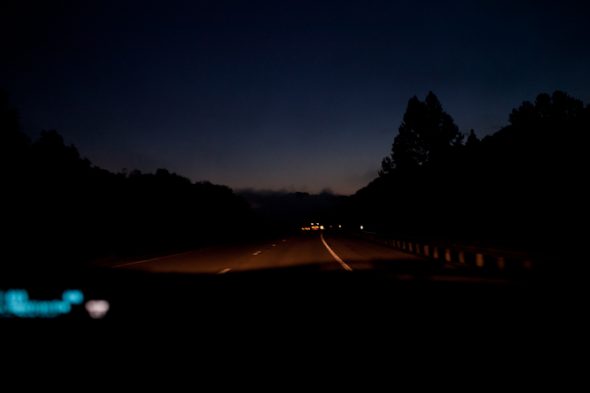
The following photos and writing were done while driving through the Appalachians in West Virginia
We leave at dusk and head East. The car is quiet. All you hear are the sounds of the wind, the trucks passing and wipers making way in the fog. Clouds gather and your eyes get heavy. Don’t fall asleep at the wheel. Don’t fall asleep. Sleep will derail us. It will kill us.
Cutting through a mountain is work. Clouds live here. They are happy hugging trees, steeples and windshields. From this close, they are puffs of second hand smoke but healthier.
The rocking of the road tries again to put us to sleep but a light rips the clouds. Our eyes widen. We squint and then pull the visors down. The day begins and we are reminded that this is what we live for.
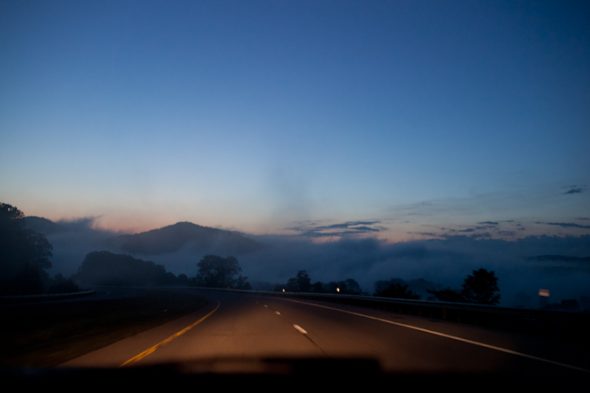
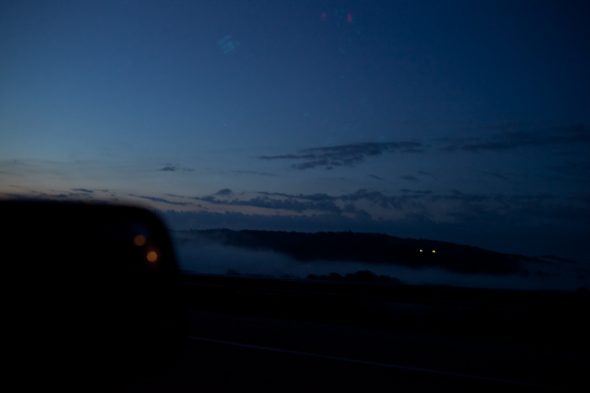

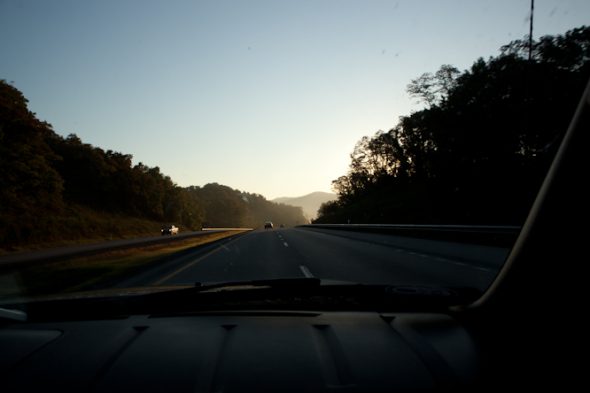

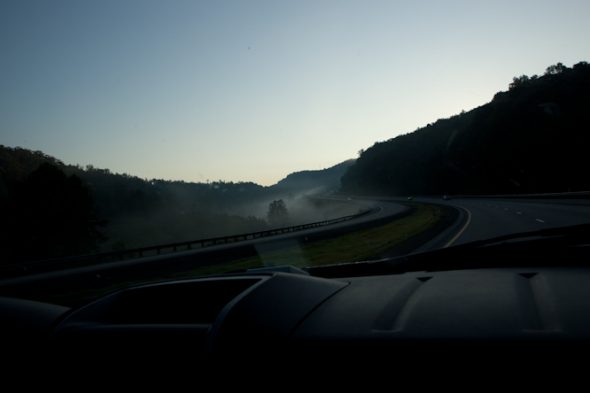
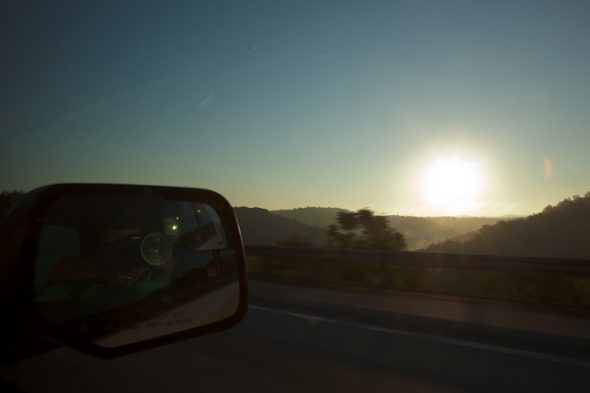
Category:
Tagged with:
Share it:
